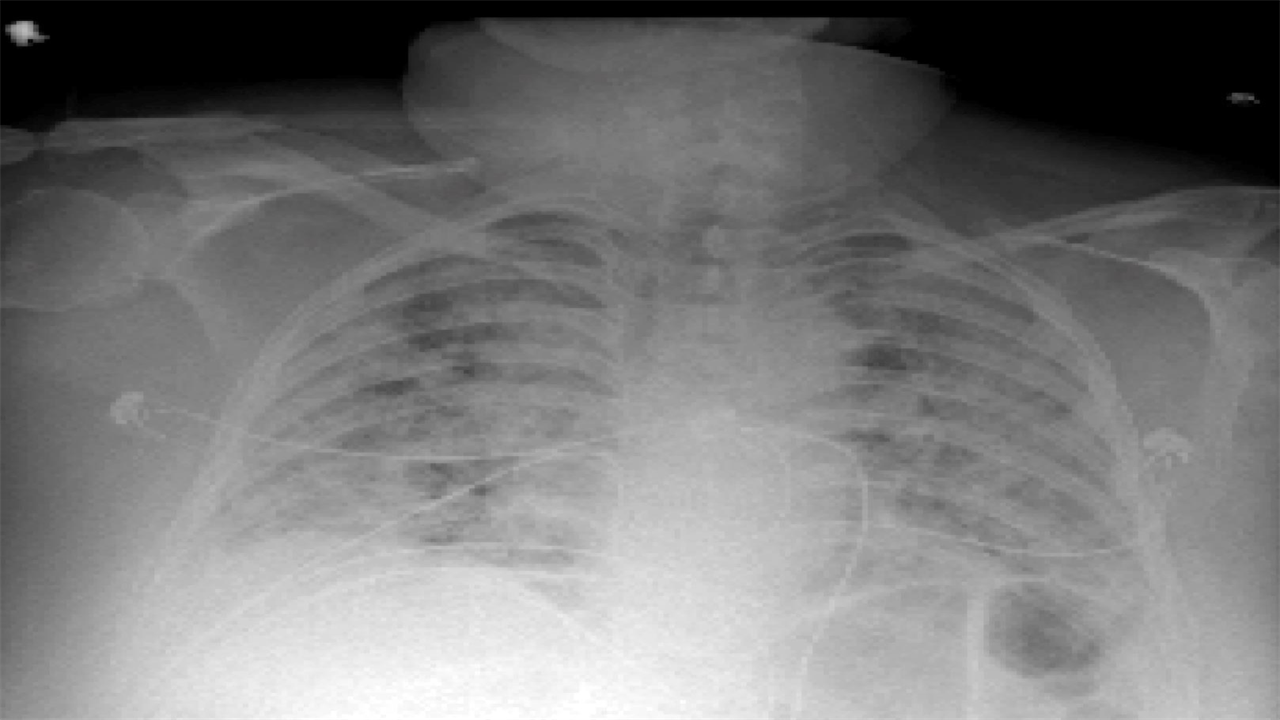Artificial Intelligence Accurately Predicts if COVID-19 Patients Will Develop Life-Threatening Complications
0 View
Share this Video
- Publish Date:
- 14 May, 2021
- Category:
- Covid
- Video License
- Standard License
- Imported From:
- Youtube
Tags

Chest X-ray of a critically ill COVID-19 patient, showing infected tissue (in white patches) spread over the lungs. Credit: Courtesy of Nature Publishing or npj Digital Medicine
Trained to see patterns by analyzing thousands of chest X-rays, a computer program with 80 percent accuracy predicted which COVID-19 patients would develop life-threatening complications within four days, a new study finds.
The program, developed by researchers at NYU Grossman School of Medicine, used hundreds of gigabytes of data collected from 5,224 chest X-rays of 2,943 critically ill patients infected with SARS-CoV-2, the virus behind the infections.
The study authors, who published online May 12 in the journal npj Digital Medicine, cited the “urgent need” for the ability to quickly predict which COVID-19 patients are likely to have fatal complications so that treatment resources can best be used. are tailored to those patients. at increased risk. For reasons not yet fully understood, the health of some COVID-19 patients suddenly deteriorates, requiring intensive care and increasing their risk of death.
To meet this need, the NYU Langone team fed not only X-ray information into their computer analysis, but also the age, race, and gender of the patients, along with various vital signs and lab test results, including weight and body temperature. , and the level of the immune cell in the blood. Also factored into their mathematical models, which can learn from examples, were the need for a mechanical ventilator and whether each patient continued to survive (2,405) or died (538) of their infections.
Researchers then tested the predictive value of the software tool on 770 chest X-rays of 718 other patients admitted for COVID-19 from March 3 to June 28, 2020 through the emergency room of NYU Langone hospitals. The computer program accurately predicted four out of five infected patients who required intensive care and mechanical ventilation and / or died within four days of admission.
“Emergency care physicians and radiologists need effective tools, like our program, to quickly identify those COVID-19 patients whose condition is most likely to worsen rapidly so that healthcare providers can better monitor and intervene earlier,” says co-principal investigator Farah. Shamout, PhD, an assistant professor of computer engineering on the campus of New York University in Abu Dhabi.
“We believe our COVID-19 classification test is the largest application of artificial intelligence in radiology to meet some of the most pressing needs of patients and caregivers during the pandemic,” said Yiqiu “Artie” Shen, MS, a doctoral student at NYU Data Science Center.
Study senior researcher Krzysztof Geras, PhD, an assistant professor in the Department of Radiology at NYU Langone, says a big advantage of machine intelligence programs like theirs is that their accuracy can be tracked, updated, and improved with more data. He says the team plans to add more patient information as it becomes available. He also says the team is evaluating which additional clinical test results can be used to improve their testing model.
Geras says he hopes to deploy the NYU COVID-19 classification test for emergency physicians and radiologists soon, as part of further research. In the meantime, he is working with doctors to develop clinical guidelines for its use.
Reference: “An Artificial Intelligence System to Predict the Decline of COVID-19 Patients in the Emergency Department” by Farah E. Shamout, Yiqiu Shen, Nan Wu, Aakash Kaku, Jungkyu Park, Taro Makino, Stanisław Jastrzębski, Jan Witowski, Duo Wang, Ben Zhang, Siddhant Dogra, Meng Cao, Narges Razavian, David Kudlowitz, Lea Azour, William Moore, Yvonne W. Lui, Yindalon Aphinyanaphongs, Carlos Fernandez-Granda and Krzysztof J. Geras, May 12, 2021, npj Digital Medicine.
DOI: 10.1038 / s41746-021-00453-0
Funding support for the study was provided by National Institutes of Health grants P41 EB017183 and R01 LM013316; and National Science Foundation grants HDR-1922658 and HDR-1940097.
In addition to Geras, Shamout, and Shen, other NYU Langone researchers involved in this study are co-principal investigators Nan Wu; Aakash Kaku; Jungkyu Park; and Taro Makino; and fellow researchers Stanislaw Jastrzebski; Duo Wong; Ben Zhang; Siddhant Dogra; Men Cao; Narges Razavian; David Kudlowitz; Lea Azour; William Moore; Yvonne Lui; Yindalon Aphinyanaphongs; and Carlos Fernandez-Granda.










